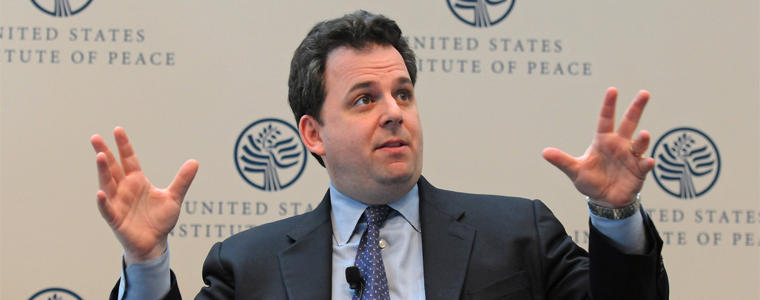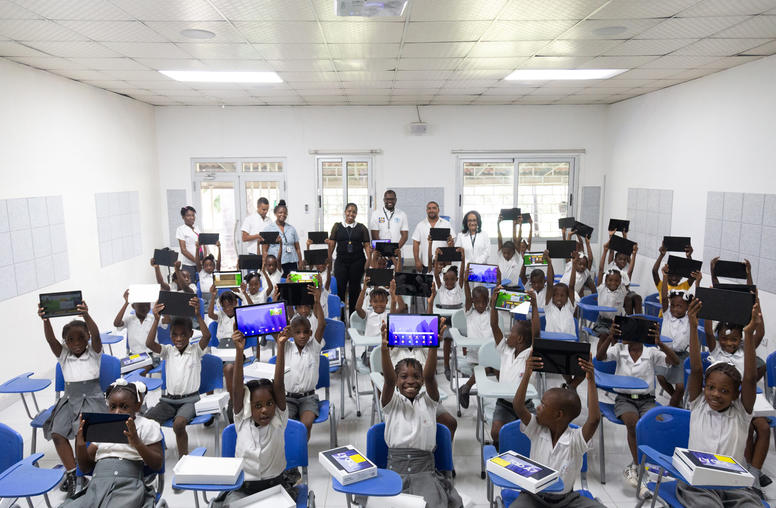State’s Shapiro, at USIP, Outlines U.S. Policy on Peacekeeping
Calling United Nations and regional peacekeeping a “strategic priority” and a cost-effective way of bolstering U.S. national security, Assistant Secretary of State for Political-Military Affairs Andrew Shapiro laid out U.S. policy for expanding the number and capabilities of peacekeepers deployed to conflict zones before an audience at the United States Institute of Peace (USIP) on February 27.

Calling United Nations and regional peacekeeping a “strategic priority” and a cost-effective way of bolstering U.S. national security, Assistant Secretary of State for Political-Military Affairs Andrew Shapiro laid out U.S. policy for expanding the number and capabilities of peacekeepers deployed to conflict zones before an audience at the United States Institute of Peace (USIP) on February 27.
Shapiro also announced that the United States, which currently holds the presidency of the G-8 countries and is hosting its next summit in Camp David in May, will spearhead a G-8 “Protection of Civilians Action Plan” that will aim to improve the ability of deployed peacekeepers to protect civilians on the ground. He said that the G-8 “will give special emphasis to child protection and the prevention of sexual and gender-based violence.”
USIP is deeply involved in training foreign military and police personnel for peacekeeping assignments, and Shapiro noted that “USIP has long been a leader in this field” providing training, in particular, for African security personnel and advisors for the Afghan defense and interior ministries. He also credited USIP’s reports and studies with “helping those of us in government do our jobs better.”
The last decade has seen dramatic growth in global peacekeeping operations—with some 100,000 troops, observers and police in 15 U.N. missions in such countries as Liberia, Timor-Leste, Haiti and Kosovo. (The U.N. is also supporting an African Union mission in Somalia, where an 8,000-strong force is expected to expand to 18,000.) The missions have grown in complexity compared to a more traditional approach of interposing peacekeepers between combatants along a ceasefire line, Shapiro noted, with peacekeeping missions now mandated to perform peace-enforcement activities, policing, security sector reform, demining and even election support. “They help lower the temperature in conflict zones and can create an environment in which disputes can be resolved peacefully,” he said. “Often times the difference that peacekeepers make is simply in preventing a bad situation from getting worse.”
Despite a relative lack of media attention in the United States, these operations directly benefit U.S. security at lower cost, Shapiro argued. “When these peacekeepers deploy, it means that U.S. forces are less likely to be called on to intervene….Frankly, it is hard to find a better value for the money than international peacekeeping operations.” The United States contributes about a quarter of the cost of U.N. peacekeeping, about $2 billion.
In addition, the United States is spending about $155 million annually to train and equip troops and police for U.N. and other peacekeeping operations. Shapiro lauded a record of bipartisan support for a State Department-run program called the Global Peace Operations Initiative (GPOI), which was launched under President George Bush in 2004. GPOI aims to build the training capabilities of countries contributing peacekeepers and to increase the overall number of deployable troops and police. The United States is also providing logistical support, equipment and transport. Shapiro said that GPOI efforts have helped train nearly 200,000 peacekeepers since 2005, 140,000 of whom have been sent into operations. He said the U.S. focus has been shifting from direct training of peacekeepers to a “train-the-trainer” approach.
Within the U.S. government, the Defense Department implements about half of GPOI’s efforts to build peacekeeping capacity, while State handles the other half, mostly through the Africa Contingency Operations Training and Assistance (ACOTA) program.
USIP has been playing what Shapiro called “a vital role” in ACOTA training. Specialists from the Institute have conducted 39 training workshops to strengthen skills in mediation, negotiation and protection of civilians since 2008, 17 of them last year. At the State Department’s request, the pace of USIP trainings will grow in 2012. The sessions typically run three to five days and have taught more than 1,200 African military officers heading for peacekeeping assignments. Held in English or French, the trainings have been given to officers from Nigeria, Malawi, Tanzania, Rwanda, Uganda, Togo, Burundi and Senegal, and they concentrate on practical approaches to dangers that peacekeepers are likely to encounter in conflict areas in Africa and elsewhere.
Similarly, since 2005 USIP has run 10 trainings for nearly 1,000 “stability police” from a number of Asian, African and European countries. Those workshops are conducted at the Center of Excellence for Stability Policy Units (CoESPU) in Vicenza, Italy. Police officers trained by Institute specialists have gone on to serve in peacekeeping missions in Bosnia, Kosovo, Timor-Leste, Congo and Angola, and USIP’s support is continuing. “We provide a part of the training that is not available off the shelf everywhere,” said Theodore Feifer, a senior program officer and trainer from USIP’s Academy for International Conflict Management and Peacebuilding.
Shapiro, in his USIP remarks, decried “a systematic shortfall in the supply of well-qualified peacekeepers, which continues to undermine the successful execution of U.N. and regional peacekeeping mandates.” He said the United States is helping the U.N. to establish peacekeeping training standards for infantry, staff officers and medical units; working with others to institutionalize knowledge from past operations; and studying ways to assist the U.N. to overcome its lack of key military equipment, particularly helicopters, infantry vehicles and strategic airlift for troops and materiel. “The plain fact is that U.N. and regional peacekeepers often lack the necessary tools” to conduct robust peacekeeping, Shapiro said.
And yet, he added, “it is safe to say that demand for peacekeeping missions will remain robust in the decade ahead.”
Such demands are being heard even now in some quarters in response to a popular uprising in Syria that is facing ongoing, deadly attacks from the military and other forces of President Bashar al-Assad. The Arab League has called for joint U.N.-Arab participation in peacekeeping in Syria. Shapiro, however, suggested that such proposals are premature. “There’s not a peace to keep right now,” he acknowledged in response to a question. Shapiro also said there was “no consensus” at the U.N. Security Council on how to proceed, a reference to the twin vetoes by Russia and China of a resolution on Syria in February that was backed by the Obama administration.


